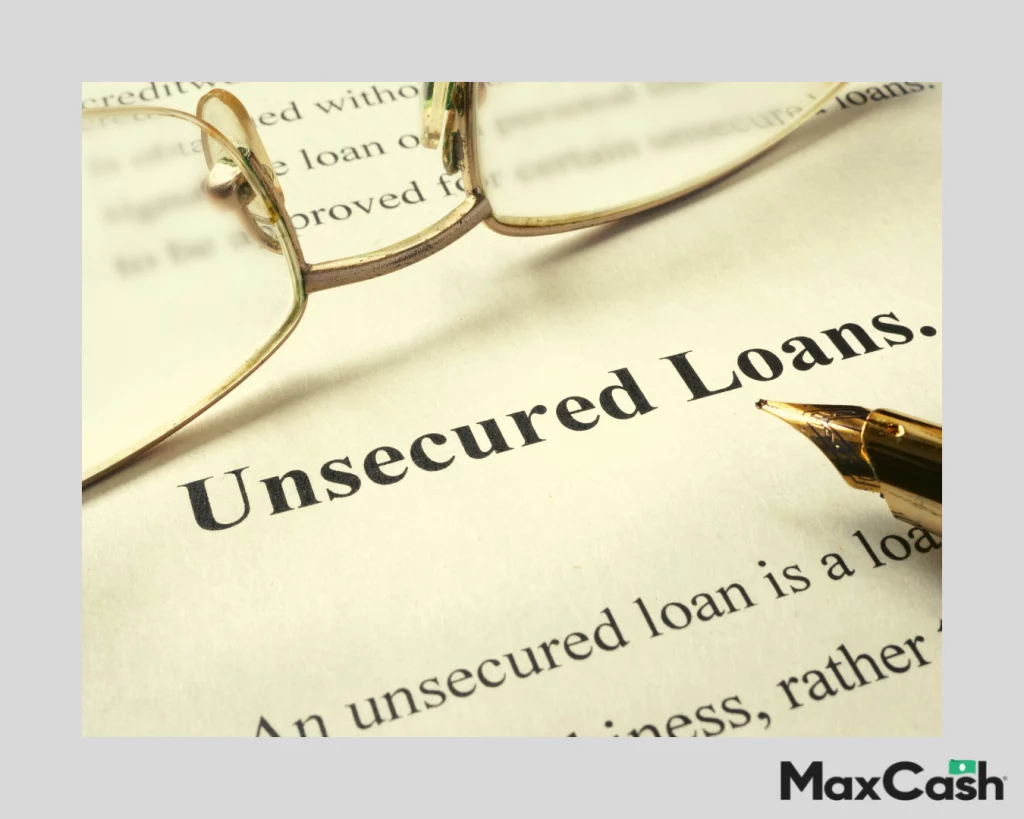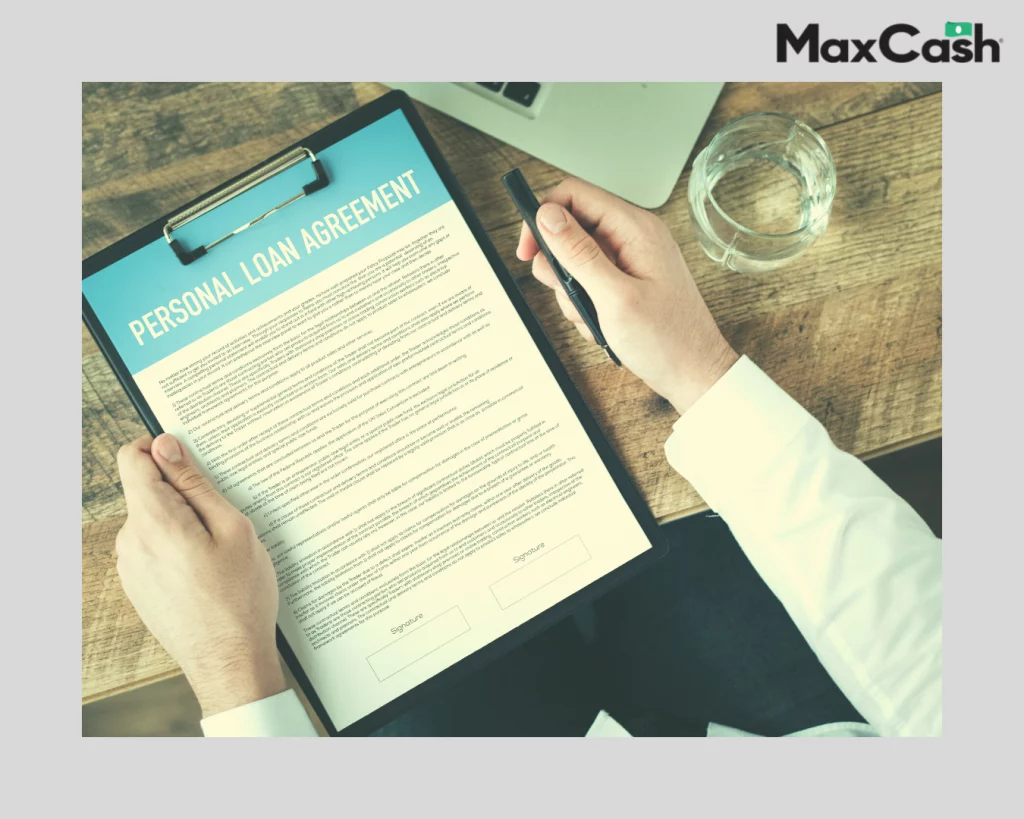What Makes Personal Loans Unsecured?
An unsecured personal loan is a type of loan that does not require any collateral to be put up as security. This means that the borrower is not required to offer any assets, such as a car or a house, as a guarantee that they will pay back the loan. Instead, the lender relies on the borrower’s creditworthiness and financial history to determine whether or not to extend the loan. Lenders also use this information to determine the interest rate offered.
Unsecured personal loans are often used for a variety of purposes, such as consolidating debt, paying for home renovations, financing a wedding or vacation, paying for unexpected expenses, or financing another major purchase. They can be obtained from banks, credit unions, online lenders, and other financial institutions. Personal loans are a potentially convenient and flexible way to borrow money, but they also come with some risks and limitations. Max Cash® will take a closer look at unsecured personal loans and how they work, as well as the pros and cons of this type of borrowing.
The terms and conditions of unsecured personal loans vary depending on the lender and the borrower’s creditworthiness and financial situation. Interest rates on unsecured personal loans are usually higher than those on secured loans because the lender does not have the same level of protection in case the borrower defaults on the loan.
It is important for borrowers to carefully consider their options and do their research before taking out an unsecured personal loan. They should compare loan offers from multiple lenders, carefully review the terms and conditions, and make sure they understand the repayment terms and any fees or charges associated with the loan. Borrowers should also consider their ability to make the monthly loan payments before taking out an unsecured personal loan.
How Unsecured Personal Loans Work
When you apply for an unsecured personal loan, the lender will assess your creditworthiness and financial history to determine whether or not you are a good risk. This includes looking at your credit score, which is a numerical representation of your creditworthiness based on your credit history. Lenders use credit scores to predict the likelihood that a borrower will repay their loans on time.
In addition to your credit score, lenders may also consider other factors. These factors include your income, employment history, and debt-to-income ratio. Your debt-to-income ratio is a measure of your ability to manage your debt. It is calculated by dividing your total monthly debt payments by your gross monthly income. A high debt-to-income ratio may indicate that you have too much debt relative to your income. This could make it difficult for you to repay an unsecured personal loan.
If you are approved for a loan, the lender will provide you with a loan agreement. This agreement outlines the terms and conditions of the loan, including the interest rate, loan amount, and repayment schedule. It is important to carefully review the loan agreement. Make sure you understand all of the terms before you agree to the loan.
Interest rates on unsecured personal loans can vary widely depending on the lender and the borrower’s creditworthiness. Borrowers with good credit scores may be able to qualify for lower interest rates. While those with poor credit scores may be charged higher rates. It is a good idea to shop around and compare offers from multiple lenders. That way, you can find the best interest rate and loan terms for your needs.
What Is Important to Remember About Unsecured Personal Loans?
There are several important things to remember about unsecured personal loans:
- Unsecured personal loans are not backed by collateral: Because unsecured personal loans are not backed by collateral, the lender is taking on more risk by lending to the borrower. As a result, interest rates on unsecured personal loans are usually higher than those on secured loans.
- Creditworthiness is important: Because unsecured personal loans are not backed by collateral, the lender relies on the borrower’s creditworthiness and financial history to determine the loan’s terms and whether to approve the loan. Borrowers with good credit scores and a strong financial history are more likely to be approved for unsecured personal loans and receive more favorable terms.
- Comparison shopping is important: Borrowers should shop around and compare loan offers from multiple lenders before deciding on an unsecured personal loan. This can help them find the best terms and rates.
- Carefully review the terms and conditions: Borrowers should carefully review the terms and conditions of any unsecured personal loan they are considering, including the interest rate, repayment terms, and any fees or charges associated with the loan.
- Consider the repayment terms: Borrowers should make sure they can afford the monthly loan payments before taking out an unsecured personal loan. They should also consider the length of the loan and the total amount of interest they will pay over the life of the loan.
- Defaulting on the loan can have serious consequences: If a borrower defaults on an unsecured personal loan, the lender has no collateral to recover and may take legal action to recover the funds. This can lead to negative marks on the borrower’s credit report and can make it more difficult to obtain credit in the future.
Pros and Cons of Unsecured Personal Loans
Unsecured personal loans have a number of benefits, but they also come with some drawbacks. Here are some of the pros and cons of this type of borrowing:
Pros
No collateral required
Unsecured personal loans do not require any collateral. Meaning you do not have to put up any assets as security for the loan. This can be especially appealing if you do not have any valuable assets to offer as collateral. Or if you prefer not to risk losing your assets if you are unable to pay back the loan.
Flexible use
Unsecured personal loans can be used for a variety of purposes. Examples include consolidating debt, paying for home renovations, or financing a major purchase. This flexibility can make it easier to find a loan that fits your needs.
Quick and convenient
Unsecured personal loans can often be obtained quickly and easily, with some lenders offering online application and approval processes. This can make it a convenient option for borrowing money in a pinch.
Cons
Higher Interest Rates
One of the biggest cons of an unsecured personal loan is that they often have higher interest rates than secured loans. This is because the lender is taking on more risk by lending money without any collateral to back it up. If the borrower defaults on the loan, the lender has no way to recoup their losses. As a result, they charge a higher interest rate to compensate for this added risk.
Limited Loan Amounts
Another con of an unsecured personal loan is that they often have lower loan amounts available compared to secured loans. Because the lender is taking on more risk, they may be unwilling to lend large amounts of money without any collateral to back it up. This can be frustrating for borrowers who need a larger loan to cover their expenses.
Strict Credit Requirements
To qualify for an unsecured personal loan, borrowers typically need to have a good credit score and a stable financial history. Lenders use this information to determine the borrower’s creditworthiness and their ability to repay the loan. If a borrower has a low credit score or a history of financial difficulties, they may have a harder time qualifying for an unsecured personal loan.
Potential for Fraud
Unfortunately, the lack of collateral with unsecured personal loans makes them more susceptible to fraud. Borrowers may be tempted to provide false information on their loan application. They may do this in order to qualify for a loan they wouldn’t otherwise be able to get. This can lead to financial difficulties for the borrower. If they are unable to repay the loan, this can also damage their credit score.
Limited Use of Funds
An unsecured personal loan can only be used for specific purposes, such as paying off debt or covering unexpected expenses. They cannot be used to fund a business or to make investments. This can be limiting for borrowers who have other financial goals in mind.
Longer Repayment Periods
Unsecured personal loans often have longer repayment periods than secured loans. This means that borrowers may be paying back the loan for a longer period of time. This can become a heavy financial burden. The longer repayment period also means that borrowers will pay more in interest over the life of the loan.
Increased Financial Pressure
Taking out an unsecured personal loan can be a financial burden. Especially if the borrower has a high-interest rate and a long repayment period. This can increase the borrower’s financial pressure and make it harder for them to make their monthly payments. It’s important for borrowers to carefully consider their financial situation before taking out an unsecured personal loan. They also need to make sure they can afford the monthly payments.
An unsecured personal loan can be a convenient option for borrowers who need access to funds quickly. However, there are several factors to consider before making a decision. These include higher interest rates, limited loan amounts, strict credit requirements, the potential for fraud, limited use of funds, longer repayment periods, and increased financial pressure. It’s important for borrowers to carefully weigh the pros and cons of an unsecured personal loan. You should also consider all alternative options before making a decision.
Max Cash Can Help Get You The Cash You Need!
We work to find you the lenders with just one convenient form. So click here to start a personal loan inquiry today!2 5





